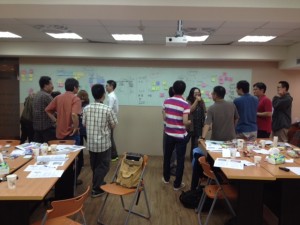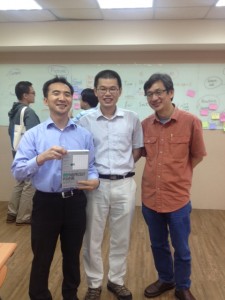■参加募集・申込締切延長 7月4日まで
ACM 国際大学対抗プログラミングコンテスト 2014 アジア地区予選 東京大会
ACM International Collegiate Programming Contest
Asia Regional Contest 2014 in Tokyo, Japan
http://icpc.iisf.or.jp/2014-waseda/
ACM 国際大学対抗プログラミングコンテストは,ACM(Association for
Computing Machinery)が主催する大学生を対象にした世界的規模のプログラ
ミングコンテストです。2014 年度で第 39 回を迎えます。2013 年度大会では,
全世界 94 カ国の 2,286 大学から 32,043 人が世界各国で開催された地区予選
に参加しました。コンテストでは,3 名の学生と 1 名のコーチからなるチーム
が,できるだけ多くの問題をできるだけ短時間で解くことを競います。
今般アジア地区予選の一つとなる東京大会への参加を募集します。日本で開催さ
れるアジア地区予選は通算 17 度目で,今回は早稲田大学が 3 度目のホスト校
となって東京大会を行います。
大学生のプログラミング技術を競う国際大会として,国内外から高い評価を与え
られている場ですので,プログラミング技術を磨き世界の頂点を目指したい学生
がたくさん参加されることを期待しています。今年もおかげさまで300を超える
チームから既に参加申し込みをいただいていますが,申し込み手続きに時間を
要しているチームが多いため締切を7月4日まで延長しました。無論,今からの
新たなチームの申し込みを歓迎します。
■国内予選
国内予選は,本コンテストの第一関門です。国内予選で上位に入ると,10 月開
催の東京大会に出場できます。開催要項・参加資格などは次の通りです。
国内予選で特に成績優秀なチームは,台湾・韓国など他の国で開催されるアジア
地区予選に派遣されるチャンスもあります。
参加チーム: 1チーム 3 名の学生とコーチ1名
<選手> 同じ大学(大学院も含む)・短大(専攻科も含む)・高専(4 年次以
上;専攻科も含む)に在籍し,大学・短大入学後(高専では 3 年次修了
後)5 年以内であること,など(資格の詳細は WWW ページを参照)
<コーチ> 教員あるいは大学院生
参加申込: http://icpc.iisf.or.jp/2014-waseda/ の「参加登録」から手続き
申込締切: 2014 年 7 月 4 日(金)
開催日: 2014 年 7 月 11 日(金) 16 時半~19 時半
場所: 各大学(インターネット使用)
問題記述: 英文(ただし、国内予選では日本語も併記)
使用言語: C,C++,Java
参加申込はコーチが行ってください。1 名が複数のチームのコーチになることも
可能です。 国内予選通過チームには,東京大会出場に係る旅費の補助および宿
泊先の用意を予定しています。
■アジア地区予選東京大会
国内予選を通過したチームが参加します。アジア地区予選東京大会の優勝チーム
は 2015 年春に行われる世界大会に招待されます。2 位以下のチームでも世界各
地区への枠の配分によっては,世界大会進出の可能性があります。
日時: 2014 年 10 月 18 日(土)~20 日(月)
10 月 18 日(土): 参加受付、トライアルユース(練習)など
10 月 19 日(日): コンテスト本番、表彰式など
10 月 20 日(月): エクスカーション(企業見学予定)
場所: 国立オリンピック記念青少年総合センター(東京都渋谷区)
主催: 早稲田大学,(公財)情報科学国際交流財団
後援(予定): 文部科学省,総務省,経済産業省,(独)科学技術振興機構,
情報サービス産業協会
協賛(予定): 情報処理学会,日本ソフトウェア科学会
スポンサー:
IBM, AtCoder, ワークスアプリケーションズ, LINE, ドワンゴ,
Wantedly, DreamArts, KLab, グリー, エム・ソフト, NTTコムウェア 他
実行委員長: 鷲崎 弘宜(早稲田大学)
審判長: 田中 哲朗(東京大学)
■ご質問・お問い合わせ
ACM-ICPC 東京大会実行委員会
URL: http://icpc.iisf.or.jp/2014-waseda/
E-mail: icpc2014@list.waseda.jp


